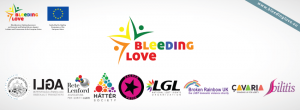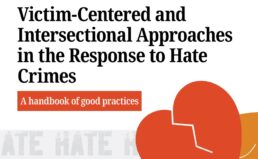Data provided by the EuroBarometer Report by the European Commission showed that five years ago almost 43% of women in Lithuania were victims of domestic and dating violence. Despite the lack of research on the topic, the number of women victims of domestic and dating violence is expected to have increased in recent time. However, the lack of research appears even more significant when we focus on a precise target-group in the spectrum of the victims: lesbian and transwomen. But before focusing on this minority, it is important to take a step backward.
A significant progress in the path towards legal protection of women from domestic violence in Lithuania was taken in 2011, when the Law on Protection against Domestic Violence was approved. In the Lithuanian legal framework, this law represented a landmark case since Lithuania in 2011 was one of the only two EU countries that did not have any form of legal protection for victims of domestic law. The Law aimed at defining more clearly the different forms of domestic violence (that previously were generally treated by the Criminal Code of the Republic of Lithuania), at making it easier to persecute perpetrators and at more efficiently helping the victims of domestic violence with adequate support. But is this law equal for everybody when it comes to lesbian and transgender women? And does this law apply to cases of dating violence?
Today, the national LGBT* association LGL interviews Elena Dapkūnaitė, Chair of the Board of the organization and figurehead of the lesbian community of Vilnius, Lithuania in order to get an answer to these questions and to obtain more insight on a problem that is still invisible at societal levels and even inside the lesbian community itself.
Elena, is it domestic/dating violence against lesbians and transwomen an existing problem in Lithuania? Is it a visible one?
“Dating and domestic violence against women is still a taboo, not only for lesbian and transwomen. People simply don’t talk about it, at every level of society. Hiding emotions is unfortunately a legacy of the Soviet era that is still deeply embedded in today’s society. However, when the problem regards lesbian and transwomen, the issue becomes ten times more complicated. Even the same LGBT* community struggles in accepting and understanding the problem.”
What do you think are the causes in of domestic and dating violence in Lithuania?
“The causes of dating and domestic violence are the same that respectively affect heterosexual couples and heterosexual women. However, there is an extra factor that must be considered. For example, as far as dating violence is concerned, living in a hostile society as is the Lithuanian one, means that couples also experience a considerable amount of frustration and insecurity, and in many cases homophobia is internalized. Feeling insecure and frustrated all the time can cause someone to act more violent than usual and because society doesn’t accept homosexual relationships, homosexual couples know that their relationship are at risk of being outed, being the object of discrimination, or even blackmailed. These are not things that usually occur in heterosexual relations, consequently increased pressure if faced by lesbian and transwomen in dating situations. If we are speaking instead on domestic violence, we obviously must consider the fact that Lithuania is one of the most homophobic country in the European Union. In a country where hate speech is so wide-spread and tolerated, society is obviously negatively impacted by this. This means that families are usually not accepting that a member of their familiar nucleus have a different sexual orientation or does not strictly conform to a specific gender category. Further pressure that friends, acquaintances, employees know about this, makes the familiar environment an unsafe place for lesbian and transwomen, since the possibilities of domestic violence against them can drastically increase.”
As far as domestic violence is concerned, victims are protected by the Law on Protection Against Domestic Violence. According to this law: “Domestic environment shall mean the environment comprising the persons currently or previously linked by marriage, partnership, affinity or other close relations, also the persons having a common domicile and a common household.” So theoretically homosexual couples sharing the household are protected by the law, right?
“Theoretically, yes. The problem is that theory is sometimes far away from the practice. The law theoretically protects also same-gender couples. So even if civil partnerships are not recognized, the law protects people who share the household. However, if the text of the law does not specifically exclude homosexual relationships, the problem is that it does not even specifically include them. Hence, if the law is gender-neutral, unfortunately it can also mean that it’s too “vague”. This implies that it can be differently interpreted according to the context and if we are taking into consideration the Lithuanian one it is hardly believable that the text of the law fully covers cases of domestic violence homosexual relationships.”
And what about dating violence for lesbian and transwomen who do not share the household? Are they protected by this law?
“No, because the law only concerns cases of violence happening inside the household. If we are speaking of dating violence outside the house walls, then the victims must be protected under the Criminal Code of the Republic of Lithuania. The problem again is that law-enforcing officials are often reluctant to enforce law provisions when the episodes of violence hit lesbian and transwomen. This is mainly because of ignorance or passive attitudes on the issue. Or, even worse, because homophobia and transphobia is widespread also at the legal-enforcement level. Hence, public officers tend to deny the problem and are not willing to help lesbian and transwomen even if this is not professional.”
What is needed now to fight domestic / dating violence against lesbians and transwomen in Lithuania?
“Since the Law on Protection Against Domestic Violence was approved in 2011, people who work with domestic violence cases are aware of episodes of violence concerning homosexual people and not only heterosexual ones. However, legal professionals, health operators and public officers should be more aware of the problem and be trained better to handle those scenarios.”
Can you perceive at the moment a wind of change in Lithuania?
“If we talk about acceptance of same-gender relationships, in general yes. But if we focus on the issue of domestic and dating violence inside and outside the LGBT* community this keeps being an invisible problem. A further complication is that at the moment LGBT* NGOs seem the only actors actively engaged in tackling the issue of domestic and dating violence against lesbian and transwomen. But LGBT* NGOs have limited tools to change this unpleasant situation, especially because most of the time they lack any form of governmental support. Consequently, not only NGOs but also legal institutions, social workers, psychologists and the education system as a whole should be prepared and open to learn about this topic and raise awareness in their fields of actions. What it is missing at the moment in Lithuania is not only reactive perception and understanding of the problem but also interaction cooperation and synergy of strategies between all the already mentioned actors at legal, institutional, social and political level.”
Interviewed by LGL’s EVS volunteer Alice Michelini
This interview was originally posted in the official project website www.bleedinglove.eu.
 Project “Bleeding Love: Raising Awareness on Domestic and Dating Violence Against Lesbians and Transwomen in the European Union” is implemented by the national LGBT* rights organization LGL and partners from 7 other European countries and aims at developing several awareness raising activities in order to broaden mutual understanding of domestic and dating violence against lesbians and transwomen in selected jurisdictions in the EU. More information about the project can be found at www.bleedinglove.eu.
Project “Bleeding Love: Raising Awareness on Domestic and Dating Violence Against Lesbians and Transwomen in the European Union” is implemented by the national LGBT* rights organization LGL and partners from 7 other European countries and aims at developing several awareness raising activities in order to broaden mutual understanding of domestic and dating violence against lesbians and transwomen in selected jurisdictions in the EU. More information about the project can be found at www.bleedinglove.eu.




